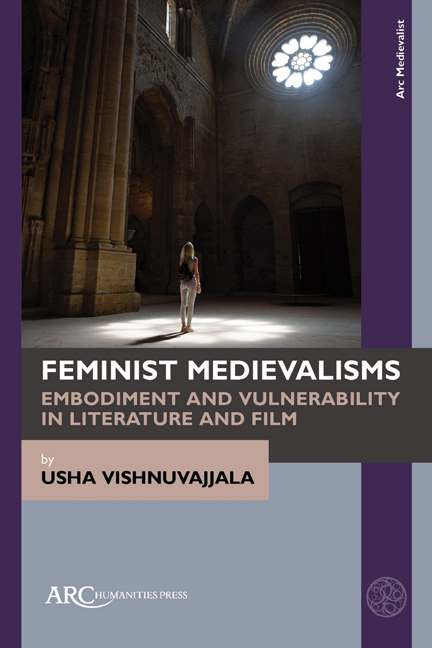Book contents
- Frontmatter
- Contents
- Acknowledgements
- Introduction
- Chapter 1 Nested Medievalisms and Affected Bodies in Jane Austen’s Northanger Abbey
- Chapter 2 Feminism and Medievalism in Woolf’s Final Works
- Chapter 3 Medievalism as Feminist Sanctuary in the late Twentieth Century
- Chapter 4 Chaucer, Vulnerable Bodies, Somatophobia, and Theory
- Conclusion: Feminisms and Medievalisms
- Select Bibliography
- Index
Chapter 2 - Feminism and Medievalism in Woolf’s Final Works
Published online by Cambridge University Press: 28 March 2024
- Frontmatter
- Contents
- Acknowledgements
- Introduction
- Chapter 1 Nested Medievalisms and Affected Bodies in Jane Austen’s Northanger Abbey
- Chapter 2 Feminism and Medievalism in Woolf’s Final Works
- Chapter 3 Medievalism as Feminist Sanctuary in the late Twentieth Century
- Chapter 4 Chaucer, Vulnerable Bodies, Somatophobia, and Theory
- Conclusion: Feminisms and Medievalisms
- Select Bibliography
- Index
Summary
JUST AS Austen’s 1816 revision of Northanger Abbey was completed in a time of political uncertainty in Britain and a transitional time for the role of medievalism in British art forms, the period with which this chapter is concerned—the late 1930s—was a time of much wider political uncertainty and eventually horror. It was also a period in which medievalism had become prominent and self-conscious in the poetry, novels, drama, and political discourse of western Europe and the United States. This was a period that saw slowly expanding rights for women in many parts of the world, and it was also one in which new forms of critique of gendered discrimination appeared. The feminist medievalisms in this period came after a century of medievalist novels and poetry that depicted women in various relationships to power, nationalist medievalist novels like Twain’s A Connecticut Yankee in King Arthur’s Court, anti-war medievalisms like David Jones’s In Parenthesis, and J. R. R. Tolkien’s The Hobbit, as well as medievalist films like The Adventures of Robin Hood (1938) and Kid Galahad (1937). With the exception of the films, most of these texts contain few women, and the ones that do appear are usually peripheral characters. Although some of these texts have a passing concern with vulnerability (such as that of hobbits in Tolkien’s novels), they are still primarily concerned with power: achieving it, disrupting it, critiquing it, or dismantling it.
On the surface, Virginia Woolf seems like an odd writer to juxtapose with these others: while much of their work can be described as nostalgic, locating the solution to present concerns in the deep (and often fictional) past, Woolf much more often criticized the past as the source of present-day problems. Woolf’s overt engagement with gender, sexuality, bodily pain, and contemporary political events would likely not have appealed to many readers of Tolkien, Twain, or Jones. And yet, as I argue here, she engages with the idea of the medieval past and with layered or nested medievalisms in important ways in her final works, Three Guineas and Between the Acts.
- Type
- Chapter
- Information
- Feminist MedievalismsEmbodiment and Vulnerability in Literature and Film, pp. 45 - 66Publisher: Amsterdam University PressPrint publication year: 2024



